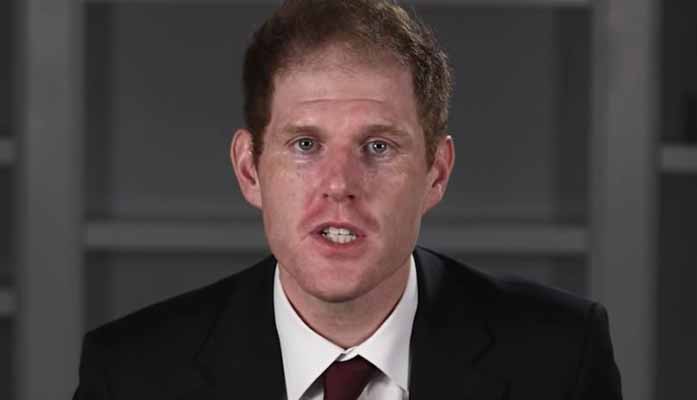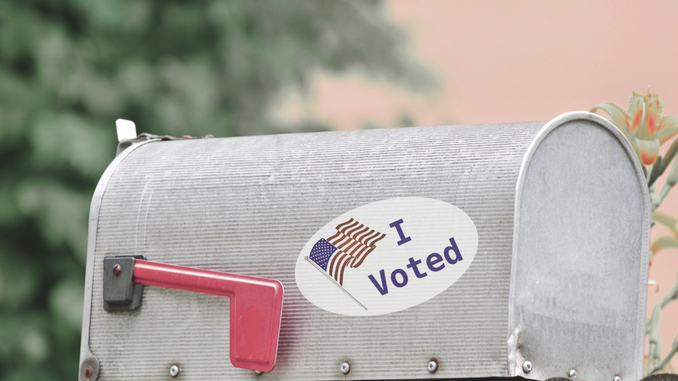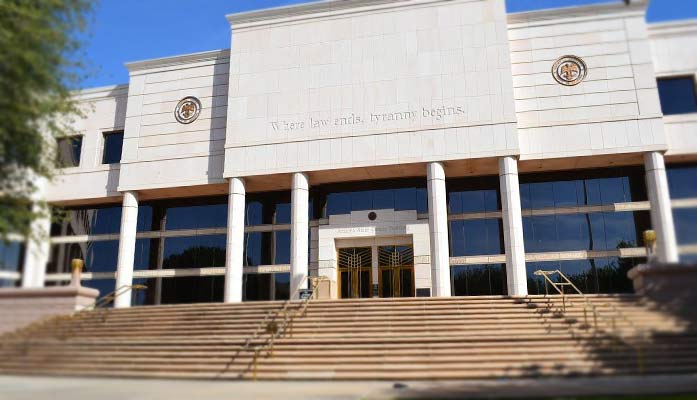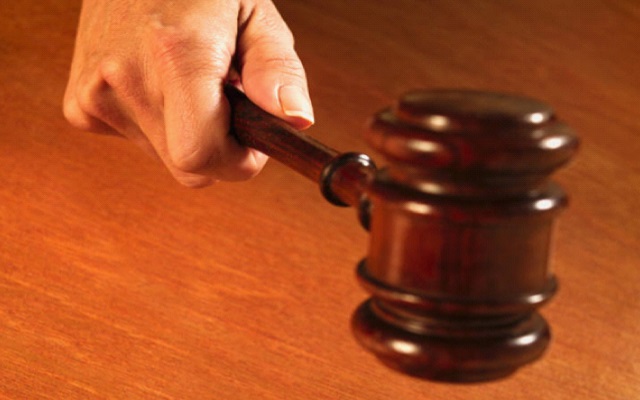
by Terri Jo Neff | Oct 13, 2022 | News
By Terri Jo Neff |
Arizona Attorney General Mark Brnovich has been asked to look into whether some of the state’s top election officials violated state law this week by issuing a statement opposing Proposition 309, which is on the Nov. 8 statewide ballot.
Prop 309 is before the voters to decide whether to amend several of Arizona’s current election laws. For an example, a “yes” vote would require voters to write their birthdate and government-issued identification number on the concealed early ballot affidavit, and for those who want to vote in-person they would be required to present an official photo identification at their polling place.
The Arizona Association of County Recorders (AACR) issued a statement Tuesday advocating a “no” vote which would leave in place the state’s existing laws about early ballot affidavits and voter identification. Among the duties of a county recorder is to conduct early voting, including mailing out early ballots and verifying signatures when early ballots are returned by voters.
Maricopa County Recorder Stephen Richer is the president of AACR and is the one who distributed the anti-Prop 309 statement on Tuesday. Yet according to election law expert Timothy La Sota, it appears Richer has violated two Arizona laws in connection with the statement, which was also posted to a website controlled by Maricopa County.
“Contrary to what Mr. Richer appears to believe, the County Recorder’s website is a publicly funded website, and using it as a vehicle to promote Mr. Richer’s political agenda is not only inappropriate, it is illegal,” attorney La Sota wrote, pointing Brnovich to Arizona Revised Statute 11-410(A) and 16-192(A). “This website is not at Mr. Richer’s disposal to use as a campaign website for his favored political causes.”
That first statute states a county “shall not spend or use its resources, including the use or expenditure of monies, accounts, credit, facilities, vehicles, postage, telecommunications, computer hardware and software, web pages, personnel, equipment, materials, buildings or any other thing of value” for the purpose of swaying an election outcome.
The second statute prohibits the state and “any public agency, department, board, commission, committee, council or authority” from spending or using public resources to influence an election, including the use of “computer hardware and software, web pages and personnel and any other thing of value of the public entity.”
La Sota pointed out that data associated with the document indicates the AACR statement -which includes the names of all 15 county recorders- was created by one of Richer’s employees during office hours, another “no no,” he told the attorney general.
“As a countywide elected official charged with various election related duties, Mr. Richer should know this,” La Sota added. “And his actions in placing his thumb on the scale illegally in this context do not auger well for maintaining a professional perception in other realms.”
During an interview Thursday morning, Amy Yentes of the Arizona Free Enterprise Club discussed why Arizona law expressly prohibits the government from electioneering activities in an effort to sway a particular race or contest.
“This is a protection for taxpayers,” Yentes told KFYI’s James T. Harris. She also supports La Sota’s request to Brnovich for an investigation into how the AACR’s anti-Prop 309 statement came to be created by a Maricopa County employee and posted to the county’s website.
“What is more disturbing is that Stephen Richer is an election administrator,” Yentes told Harris. “It is quite concerning that he can’t even follow basic election law and yet we’re trusting him to administer our elections.”
But that is not the only problem stemming from Richer’s distribution of the anti-Prop 309 statement, which he said on Tuesday afternoon was approved by AACR members by “unanimous voice vote (no nays, all ays).” Richer also tweeted that “14 of the 15 counties were present” for the vote, with only Apache County absent.
According to Cochise County Recorder David Stevens, the inference voters will make from the AACR statement and Richer’s social media comments is that all 15 county recorders are against Prop 309. In fact, Richer retweeted someone else’s comment that the vote was unanimous against the proposition.
That, Stevens says, is not true. In fact, he is an adamant supporter of Prop 309 and has demanded Richer correct the AACR statement and clear any misperception.
“Stephen, I was out of the office yesterday and did not see this email. I STRONGLY OBJECT to anyone assigning an opinion to me without my expressed consent. Silence is NOT acceptance. I do support prop 309 and kindly request you remove my name from this list and issue a retraction immediately,” Stevens wrote.
As of press time, Stevens had no contact from Richer about the Prop 309 issue. He was, however, included on a mass email the Maricopa County Recorder sent to his fellow recorders Wednesday evening.
“Good luck Recorders!” the subject line reads, before Richer wished everyone “the absolute best this early voting season.”

by Corinne Murdock | Sep 18, 2022 | Economy, News
By Corinne Murdock |
Arizona has the highest inflation rate in the country — making this state the number one victim of President Joe Biden’s inflation crisis.
The Phoenix-Mesa-Scottsdale area suffers from 13 percent inflation, according to the latest Federal Bureau of Labor Statistics data released Tuesday. Nationwide inflation rate sits just over 8 percent.
According to recent polling, the inflation and border crises are of equal importance to Arizona voters.
Arizona Free Enterprise Club (AZFEC) President Scot Mussi told AZ Free News that the Biden administration has only worsened the economic woes of Arizonans. Mussi warned that consumers would continue to cut back on major purchases, and business owners would freeze expansions and hiring. He also pointed out that any reductions in inflation weren’t due to the Biden administration’s actions, but instead consumers cutting back.
“It’s pretty clear that the decision makers in Washington want to make this situation worse,” said Mussi. “The recession will continue to linger on until policy makers get serious about runaway spending.”
While Arizonans and the rest of America were taking in the federal government’s latest inflation report on Tuesday, President Joe Biden was celebrating the controversial Inflation Reduction Act (IRA).
Biden didn’t address how the latest inflation data reflected historic highs. Rather, the president asserted that the effects of inflation were improving, and that the state of the economy should come as good news for Americans.
Arizona’s Democratic state legislators also celebrated the IRA.
However, not all within Biden’s party agreed that the IRA and other recent actions by the president are wins. In an interview this week, Senator Mark Kelly (D-AZ) refused to affirm that Biden is doing a good job as president. Congressman Andy Biggs (R-AZ-05) assessed that Kelly treaded carefully due to Biden’s unpopularity among voters.
Mick McGuire, former Arizona National Guard general and failed senate candidate, told “The Conservative Circus” on Tuesday that Kelly was just as guilty as Biden for failing Arizonans with worsening inflation.
Mussi asserted that the IRA wasn’t anything to celebrate, calling it the “Inflation Destruction Act.” He explained that the IRA wouldn’t reduce inflation. Mussi noted that the government hasn’t even distributed all of the stimulus funds from the American Rescue Plan.
“We haven’t even finished rolling out the Biden COVID recovery act: the $1.9 trillion spending palooza. There’s no discipline right now, and there’s really no end in sight,” said Mussi. “Right now, we’ve hit what would be the definition of a recession. Even if you wanted to use the Biden administration’s viewpoint, at best you could say we’re in a bad state of stagflation. There’s absolutely no growth.”
Corinne Murdock is a reporter for AZ Free News. Follow her latest on Twitter, or email tips to corinne@azfreenews.com.

by Terri Jo Neff | Aug 27, 2022 | News
By Terri Jo Neff |
Arizona Free Enterprise Club (AFEC) is reveling in Friday’s Arizona Supreme Court ruling affirming that the attempt to get the Arizona Free and Fair Elections Act on the upcoming general election ballot as a voter initiative has failed.
“The ruling today vindicates what we knew all along: the radical Free and Fair election initiative lacked enough lawful signatures to qualify for the ballot,” AFEC President Scot Mussi said after the order was issued under Chief Justice Robert Brutinel’s name. “Arizona voters, the rule of law, and basic math were victorious today.”
What would have been known as Proposition 210 on the 2022 General Election ballot included numerous changes to state law drafted by the Arizona Democracy Resource Center (ADRC Action), such as a ban on legislative election audits and allowing election day voter registration.
AFEC took the lead in opposing the voter initiative, while some elections officials worried making that many hodge-podge changes to election and campaign finance laws at one time would have negative unintended consequences.
AFEC’s legal challenge alleged myriad problems with more than one-half of the 475,290 petition signatures submitted by ADRC Action. It ended with Brutinel’s order affirming Maricopa County Superior Court Judge Joseph Mikitish’s finding that the minimum 237,645 signature threshold was missed by 1,458 signatures.
The outcome is exactly what AFEC’s Mussi predicted. In a series of statements Friday, Mussi called out ADRC Action for the “rigged methodology” the group’s attorneys pushed the courts to use when calculating the number of valid signatures. He said the mathematic gymnastics was intended “to sneak their disqualified measure onto the ballot.”
“Their dubious formula cherry picked data that boosted their numbers, even including signatures that were disqualified by the counties in the random sample,” Mussi said. “None of their formula was rooted in statute or historical precedent and was a Hail-Mary attempt to resuscitate thousands of signatures that simply should not have counted.”
The justices ordered Arizona Secretary of State Katie Hobbs to rescind the prior determination that the initiative had qualified for the ballot.

by Corinne Murdock | Aug 24, 2022 | News
By Corinne Murdock |
On Wednesday, the Arizona Supreme Court invalidated signatures of a ballot initiative seeking to overhaul the state’s election processes, making it unlikely to appear on the November ballot.
Chief Justice Robert Brutinel ruled that Arizonans For Free and Fair Elections, or the Arizona Democracy Resource Center (ADRC) Action, failed to provide a valid mailing address to receive certified mail. Brutinel remanded the case back to the Maricopa County Superior Court to determine how many signatures his order impacts.
Based on the ruling — likely to invalidate tens of thousands of signatures — and sampling rejection rates, it appears unlikely that the initiative will have enough signatures to qualify for the ballot. ADRC Action submitted over 475,000 signatures, and needs just over 237,600 to qualify.
The Arizona Free Enterprise Club (AFEC) challenged the ballot initiative. In a statement to AZ Free News, AFEC President and Executive Director Scot Mussi asserted that the legal victory protected Arizonans from the harms of outside special interests.
“We are very pleased that the Supreme Court affirmed the lower court ruling that Arizonans for Free and Fair Elections failed to gather enough lawful signatures to qualify for the ballot,” said Mussi. “This radical initiative imported 60 different provisions from Washington, D.C. that would have increased fraud, harmed small business, and empowered special interests. They spent over $7 million trying to buy their way onto the ballot, and they failed.”
The Maricopa County Superior Court’s original ruling reduced valid signatures to about 10,000 short of qualifying for the ballot, which AFEC likened to being “on life support.”
Below are some of Arizonans for Free and Fair Elections’ proposed changes:
- eliminate voter ID and proof of citizenship for voter registration
- allow same-day voter registration
- bar election audits like the most recent one for the 2020 election
- raise small business taxes to increase political campaign funding
- restore private funding in election administration
- require universal vote centers
- extend in-person early voting through the day before Election Day
- require a court order to rule someone too incapacitated to vote
- implement automatic voter registration for driver’s license and state ID recipients, as well as of-age high schoolers
- allow curbside voting
- allow “nontraditional residential addresses” such as mile markers or “geographic or other identifying features” when registering to vote
- restore the permanent early voting list (PEVL)
- restore “inactive” voters to “active” status
- permit “signature-only” voter registration
- allow third parties to register voters
- reduce contribution limits
As reported previously, ADRC Action accrued over $7.6 million from a national network of Democratic dark money for this ballot initiative. Their group traces back to a national donor network called “Way to Win,” launched for the purpose of defeating Republicans in response to former President Donald Trump’s 2016 victory.
Way to Win asserted that its $110 million in funding to key states, including Arizona and Georgia, were the reason for the Democrats’ blue wave in 2020. Way to Win’s major sources of funding include George Soros’ Open Society Foundations and family, Stryker Corporation heiress Patricia Stryker, the prominent D.C. consulting firm Arabella Advisors’ Sixteen Thirty (1630) Fund, and the Tides Foundation-backed One Arizona.
Corinne Murdock is a reporter for AZ Free News. Follow her latest on Twitter, or email tips to corinne@azfreenews.com.

by Terri Jo Neff | Aug 20, 2022 | News
By Terri Jo Neff |
There is a very good chance Arizona voters will not see the proposed Arizona Fair Elections Act on their ballots in November now that a judge has kicked out tens of thousands of petition signatures.
On Thursday, Judge Joseph Mikitish of the Maricopa County Superior Court sided with arguments from the Arizona Free Enterprise Club (AFEC) that many of the petition sheets filed by a Democratic-backed committee trying to change Arizona elections laws had, in fact, failed to comply with current election laws.
In July, the committee submitted 47,690 petition sheets containing roughly 475,000 signatures in hopes of qualifying the Arizona Fair Elections Act for the 2022 General Election ballot. At least 237,645 signatures must be deemed valid once random-sampling verification is completed by the state’s 15 county recorders.
But AFEC filed a legal challenge which alleged more than 1,000 of the circulators who collected the signatures—representing one-half of the petitions—did so in violation of one or more of Arizona’s laws.
Mikitish released an order late Thursday agreeing with several of the 32 specific objections put forth by AFEC. The effect of the judge’s ruling is that nearly 97,000 signatures will be knocked off, which puts the Act in jeopardy as the verification process continues. With a typically high sampling rejection rate, there will likely be too few verified signatures to move the Act to the ballot.
“Based on the random sample that is currently being conducted, we believe they will fall short of the minimum to qualify for the ballot by more than 10,000,” according to AFEC President Scot Mussi.
In his ruling, Mikitish noted that Arizona law calls for the constitutional and statutory requirements imposed on initiative efforts to “be strictly construed.” He added that strict compliance is defined in case law as “nearly perfect compliance” even if there will be “harsh consequences” due to a seemingly small “unfortunate mistake.”
The judge held a two-day evidentiary hearing on Aug. 15-16 and received dozens of written arguments from the parties on whether the numerous challenged circulators complied with state law.
AFEC contends the provision of the proposed AFFE Act will “upend” Arizona’s election administration and voter registration laws, curtail current safeguards with the initiative and referendum process, and reduce candidate contribution limits while promoting more taxpayer subsidies to certain candidates.
READ MORE ABOUT THE CHALLENGE HERE





